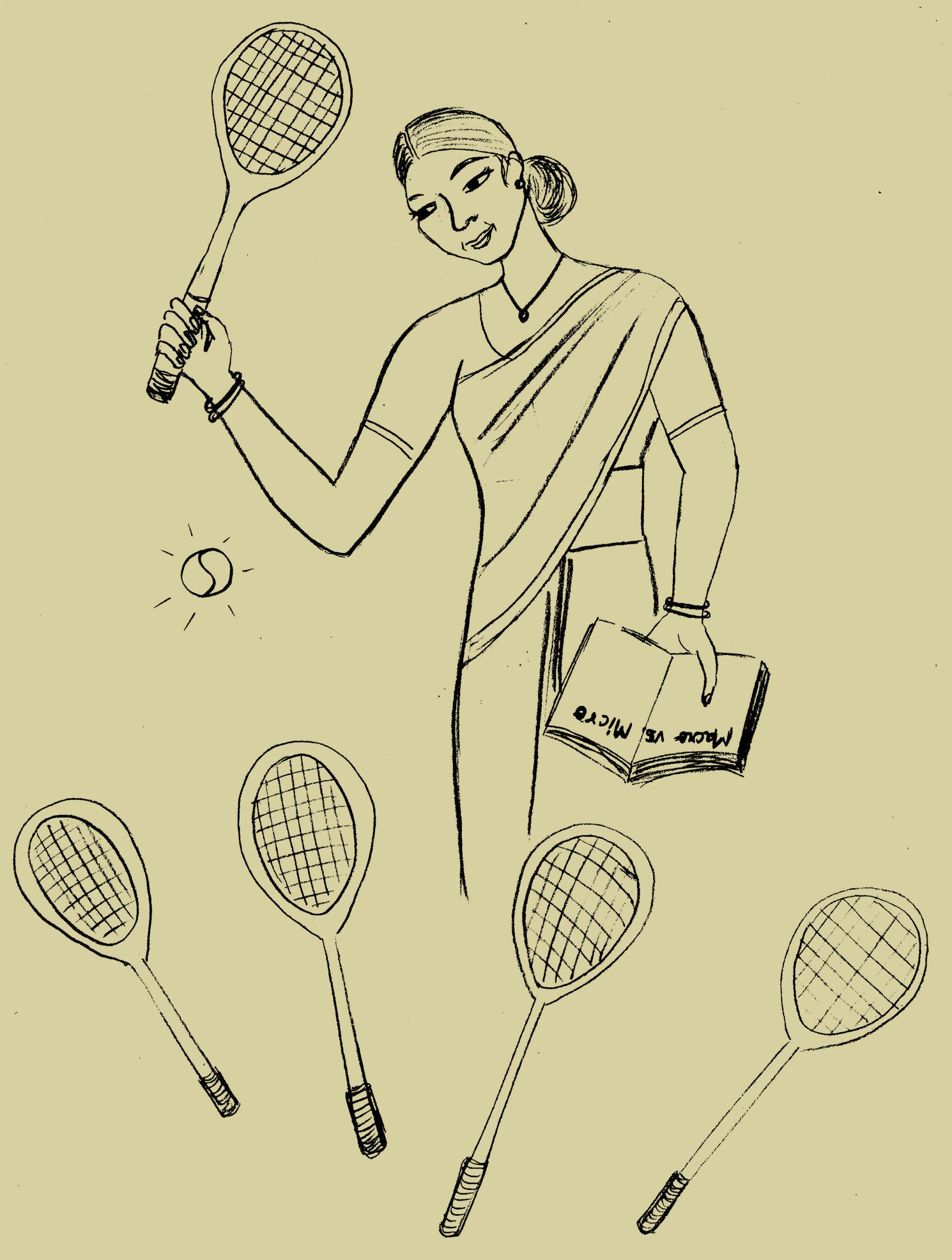Tennis In Economics

Mrs Muralidhar was trying hard to make herself heard above the buzzing and hissing sounds in the class. This class of B.Com 1st year was especially bad. They seemed to have endless things to chat about. They seemed to want to do everything but listen to Mrs Muralidhar who was trying her utmost to teach them the basic tenets of Macro Economics. After twenty minutes of unfruitful lecturing, she found her voice going hoarse and a splitting headache surfacing. She noticed that some of the students were repeatedly staring out of the window and at the sports centre. A lawn tennis match was going on and a lot of cheering could be heard.
All of a sudden, Mrs Muralidhar shut her book and said, “That seems to be a very interesting match. Shall we all go down and watch it?” The students looked at her wide-eyed, not quite sure that they had heard correctly. She repeated, “Shall we all go down and watch the match?” All of them; boys and girls, sprang up from their seats and said, “Wow! Let’s go!” They ran down the stairs and into the sports centre. Soon they were all a part of the cheering crowd. The match was a gripping one. One after the other, the players gave shot after shot. Each player had her own fan following and friends. Soon the match was over and the crowd dispersed.
The following day, Mrs Muralidhar entered the class. For once, the students smiled at her. She said, “So, class! Did you enjoy the match yesterday?” All of them chorused, “Yes, Ma’am!” She said, “Do you know what makes the match go on?” The youngsters did not understand what she was asking. “Do you know, what is the most important thing for a match to take place?” Someone said, “A tennis court!” Another voice said, “Sports man spirit;” yet another said, “Talent and commitment.” “No,” said the teacher, shaking her head. “The most important thing for a match is that there should be two players. They have to give back one for one. If either of the players does not take the shot and does not respond to the shot, the match cannot go on. How can one player alone, play a match?” The students nodded.
Mrs Muralidhar said, “Today, we are going to play Antakshari. I am not in the mood to teach.” The students were quite amused and intrigued by her but they felt that it would be fun to play along. It was boys versus girls and the game started. The girls sang a popular hindi number ending with ‘m’ The boys were quick to sing a song from a latest Bollywood film. The game went on. Each team was trying to prove its mettle. Soon it was time for the class to be over and much to everyone’s disappointment, the game came to an abrupt end. The teacher left.
Interestingly, after college was over, the game picked up again in the ground and went on for hours. The next day, Mrs Muralidhar entered and found the class to be very receptive. She said, “Friends, my last two classes with you have been very exciting and enjoyable. That was so because each one of you was eager to participate. Economics is basically a dry subject. Teaching is akin to a tennis match or a game of Antakshari. I keep giving my best shot but I get no response from you. I sing my song, but I get nothing in return. What I want to tell you is that if you do not pay attention to what I speak, this match of Economics cannot go on. Think of it as Tennis or Antakshari or Economics, but unless you are physically and mentally here and actively participating, the match ends here and now!”
Silence reigned in the class. A few minutes later the teacher said, “So, should we start the match, or shall we call it quits?” Simply and surely they said, “Start the match, Ma’am.” Well many Eco-matches were played in that class over that academic year.
The series ended with the end of B.Com 1st Year. But the story does not end here.
Forty two years later an old Mrs Muralidhar, opened a packet delivered to her by courier. Her wrinkled and aged fingers opened it to find a book, “Macro-Economics made easy” by G. M. Lamba. There was a card jutting out of the book. She opened the book at the page at which it had been flagged, to find herself staring at the ‘Dedication’ page. It read:
Dedicated to my Economics teacher, Mrs Isha Muralidhar, who taught me to play the tennis match in the economics class, each day ….”
Her trembling hands picked up the card that had fallen into her lap and read … “Ma’am, this book is … because you were … Thank you for mentoring me… Gokul Mohan Lamba.”
Teaching is not just rattling off information to a disinterested bunch of listeners. Teaching can be magical if only the teacher is really involved in it. After the parents, the teachers are the ones who leave the most lasting impressions on young minds.
